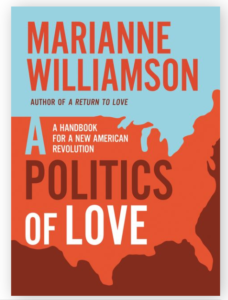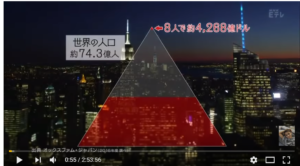
A Politics of Love Love of politics
A Politics of Love Love of politics
A Handbook for A New American Revolution
Handbook for the New American Revolution
Marianne Williamson (Marianne Williamson)
Free copy (Chapter 2) is here – English
Free copy (Chapter 2) is here – Japanese
Dr. Ravi Batra Ravi Batra Dr.
Dr. Batra Discusses the New Book with Andrew Mazzone:
Ever since the Great Recession that started in 2007, the United States has been mired in poverty, joblessness and a mountain of debt. With Congress and the president constantly at odds, the public is clamoring for a fresh approach to our economic problems, and this book delivers just that. Even the fastest growing economies of India and China have seen a slowdown and the analysis and the solutions offered in this book, while based mostly on American experience, actually apply to the whole world. Salient features of the book are:
1. The main cause of our myriad troubles is monopoly capitalism, which is a system dominated by giant companies that charge high prices, pay low wages and extract huge productivity from employees. This way supply rises faster than demand and generates layoffs; so the solution lies in breaking up the behemoths and returning to free markets, where small firms engage in price and quality competition.
2. That requires new legislation and the cooperation of Congress, which itself is either divided or beholden to monopoly capitalists. So we can’t count on the legislature.
3. The president can bring about a competitive-capitalism effect, though not actual free markets, without recourse to Congress.
4. A competitive-capitalism effect occurs when, through certain official proclamations or policies, a market arrives at a similar outcome that would prevail in the presence of small firms operating as competitive enterprises.
5. With the help of the agencies such as the FDIC and the CFTC that work for him, the president can bring about this effect in several industries including banking, oil and gasoline, pharmaceuticals as well as foreign trade
6. The FDIC has the legal authority to start its own bank, which could compete with banking giants and bring down interest rates on credit card balances from the current range of 15 – 30 percent to just 5 percent.
7. The CFTC canlegally raise margin requirements for oil futures to control speculation and bring petrol price down to $20 per barrel from the triple digit levels that prevailed until mid-2014,in spite of a relentless decline in American petroleum imports. In 1998 even a puny fall in these imports brought oil down to just $12 per barrel.
8. The president and the Federal Reserve should and can eliminate our trade deficit by doing what China and Japan do; he can offer an export-oriented exchange rate to raise our exports to the level of our imports, so that we follow a policy of balanced free trade.
9. The rural areas of emerging economies, such as India, China and Brazil, should use a putting-out system of industrialization that was very effective in eliminating poverty in pre-capitalist Europe and the United States. This system required little investment but quickly uplifted living standards in small towns and remote villages. With these type of measures, nations can not only get rid of unemployment, but they can also make a big dent in poverty, especially rural poverty. Similarly, consumer and federal debt can also be brought down, even though slowly. Economies can then become self sustaining without the government’s life support.
Face to Face with Prof. Dr. Ravi Batra, Renowned Economist – SMU Desiplaza, Dallas, Texas
Prof. Ravi Batra interviewed at DesiPlaza Studio on Jan 08th, 2017 with the host.
Ravi Batra (Ravi Batra、1943On June 27 – ) The economists of the United States、He is a professor of Southern Methodist University (Southern Methodist University)。His real name is Raveendra N. Batra。Born in Pakistan of the ancient city of Multan suburbs。The family moved to near Delhi at the time of separation from India of Pakistan、My father was a professor of Sanskrit。Delhi to travel to the US in 1969 after graduating from university、And a doctorate in the United States Southern Illinois University。
Which is a philosopher Sarkar and from youth、He is the one who inherits the Progressive Utilization Theory that Sarkar was proposed in 1959 (PROUT = Prout theory)。
Economic and social system that birth after capitalism collapse、The "Prout Social economy" that Ravi Batra is expected to、Broadly speaking, balance trade、Reduction of the wage gap、Financial Systems、Domestic industry protection、Lifetime employment、Environmental Protection、It refers to the "little society of stable co-existence and co-prosperity of the income gap" by bank regulations, etc.。He has stated that Japanese society of the 1970s or early 1960s was the closest to the ideal society in Prout Social economy、Has been acclaimed in Japan, which has been achieved at the time, "one hundred million total middle class society."。He, like his mentor Sarkar、"Surely Prout principle economy will begin from Japan, which has been achieved in the past one hundred million total middle-class society in a number of book。"It has said。
Source: Wikipedia
All talk when the change is economic history 2018 rules of desire – NHK E tele
World Top 8 People’s Total Assets = Total Assets of 3.6 Billion People (1/2 World Population)

World Total Assets
Mr. Boyan Slat
How the oceans can clean themselves: Boyan Slat at TEDxDelft
 English
English Japanese
Japanese